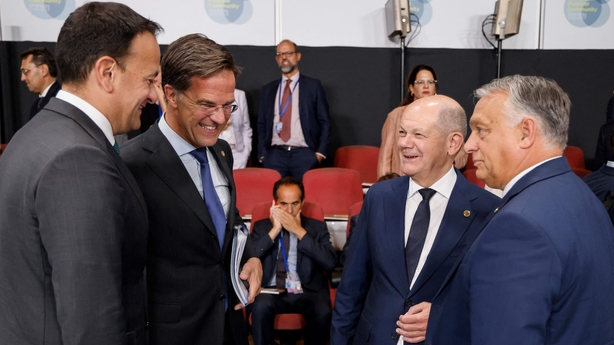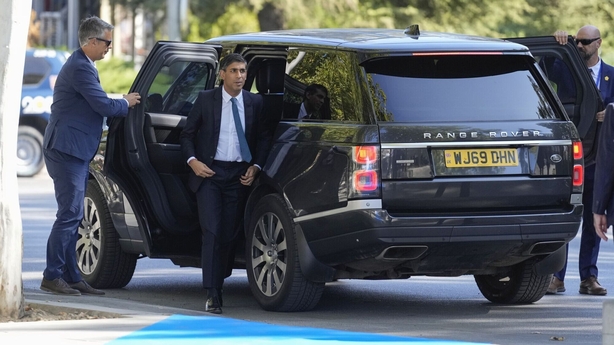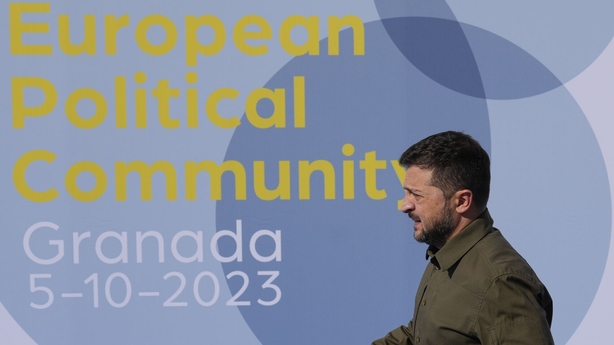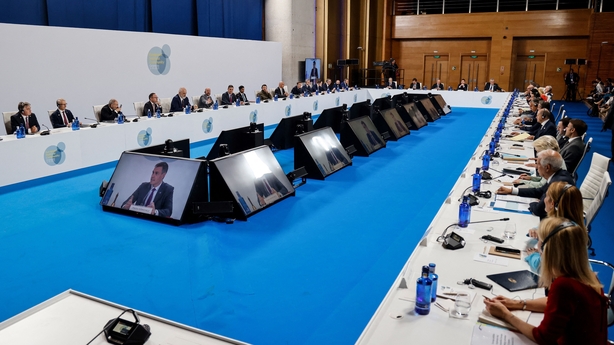Taoiseach Leo Varadkar held a bilateral meeting with the British Prime Minister Rishi Sunak on the margins of the European Political Community summit in Granada in Spain today.
According to a government source, Dublin and London will deepen contacts over how to handle undocumented third-country migrants who use the Common Travel Area to enter each other's jurisdictions.
The issue was discussed during what was described as a "constructive" bilateral meeting between Mr Varadkar and Mr Sunak.
Continental and European Union leaders are at the summit for two days of discussions on the major challenges of the day.
These include Russia's invasion of Ukraine, EU enlargement, the migration crisis and rapid technological change.
Before the meeting Mr Varadkar said they would discuss the functioning of the Common Travel Area, and how "we secure the border around Ireland and Britain as well".
It is understood officials on both sides will deepen discussions on the issue of undocumented migrants entering Ireland and crossing the land border before travelling from Northern Ireland to Britain, and vice versa.
The two leaders discussed a number of other issues.
"They spoke about their shared priority of restoring the Northern Ireland power-sharing institutions. The Taoiseach and the prime minister are fully in agreement on the importance of restoring power-sharing for the people of Northern Ireland," a government spokesperson said.
"They also discussed the UK’s Legacy Act, acknowledging that each side has different views."
The spokesperson said they spoke of the importance of Irish-British bilateral relationships, including the Euro 2028 bid.
The Taoiseach said Ireland would be happy to assist financially in redeveloping Casement Park in Belfast.
"The Taoiseach highlighted the significance of bilateral trade between Ireland and the UK, which was valued at €120 billion in 2022.
"He welcomed the recent MOU with the UK on energy, and the UK’s access to EU research partnerships in the Horizon programme."
The Taoiseach was also due to hold bilateral meetings with Armenian Prime Minister Nikol Pashinyan and a number of other leaders.

The first day of the gatherings saw 47 leaders from continental Europe, including the Caucuses and western Balkans, come together under the auspices of the European Political Community.
Speaking on arrival at the summit, Mr Varadkar said Ireland is unlikely to take a quota of asylum seekers under the forthcoming EU Migration Pact because the country was "really struggling" to accommodate the refugees that have recently arrived from Ukraine.
Yesterday the overhaul of EU migration policy was boosted by the agreement reached by member states on a final element of the so-called EU Migration Pact.
A cornerstone of the agreement, which diplomats say could be adopted before next year's European elections, is that member states would voluntarily take a quota of migrants in the event of a crisis at Europe's external borders, in order to take the pressure off frontline states like Greece and Italy.
"It wouldn't really be so much about taking a quota of refugees," Mr Varadkar said.
"We've accepted a huge number of people in the last year or two, maybe 100,000 people from Ukraine and other parts of the world.
"We're in a different place as a country now. [We're] really struggling to accommodate the numbers that we have."
Mr Varadkar accepted that if Ireland did not take a quota of asylum seekers the State would be expected to pay into a common migration fund as a recompense.
One suggestion is that it would amount to €20,000 per migrant refused.

The Taoiseach said there was no question of turning migrants away in general, beyond the requirements of the Migration Pact.
Among the leaders in attendance is Ukrainian President Volodymyr Zelensky who said his country's key priority is to strengthen its air defences as winter approaches.
"We will pay special attention to the Black Sea region as well as our joint efforts to strengthen global food security and freedom of navigation," he said on social media.
This is the third such meeting and it comes amid an unprecedented confluence of geopolitical tension.
These include Russia's invasion of Ukraine, a migration crisis on the Mediterranean Sea, the military conflict between Armenia and Azerbaijan, clashes between Kosovo and Serbia in the Balkans, and the extreme weather conditions that gripped the continent throughout the summer.

Tomorrow, the 27 leaders of the European Union will remain for an informal summit that will focus primarily on how Europe should prepare for a major enlargement in the coming decade.
Yesterday's agreement on overhauling the EU’s migration policy, in the light of huge numbers arriving in Italy, is also likely to dominate.
However, the summit's credibility suffered a blow after the president of Azerbaijan Ilham Aliyev chose to stay away, while Turkey’s President Recep Tayyip Erdogan is also expected to skip the summit.
Hopes that it would serve as a platform to calm tension in the Caucasus, where Azerbaijani forces have captured Nagorno-Karabakh from ethnic Armenian rebels, were quickly dashed.
EU officials had hoped to host Mr Aliyev and Armenia's Prime Minister Nikol Pashinyan at the event in what would have been the pair's first face-to-face meeting since the offensive.
But Mr Aliyev has been angered by what he sees as French and German bias towards the Armenian position, and has refused to travel to the meeting.

An Azerbaijani official said Mr Aliyev would not attend because of "pro-Armenian statements by French officials" and because Paris has said it plans to deliver military equipment to Yerevan.
The official said Mr Aliyev's decision was also influenced by "accusations made yesterday by EU Council President Charles Michel".
Mr Michel, who has mediated several meetings between the foes in recent years, criticised Baku's use of military force.
The official also cited an "anti-Azerbaijani atmosphere" and said Baku had wanted the meeting to take place in Turkey, its ally, which had welcomed the successful Karabakh offensive.
In Yerevan, Mr Pashinyan told parliament yesterday that he would still travel to Spain, and expressed regret he would not be meeting Mr Aliyev.
"We were in a constructive and optimistic mood, because we thought that a turning point document could be signed," he said.
"Until this morning the likelihood of this was very high."
Additional reporting Reuters, AFP






